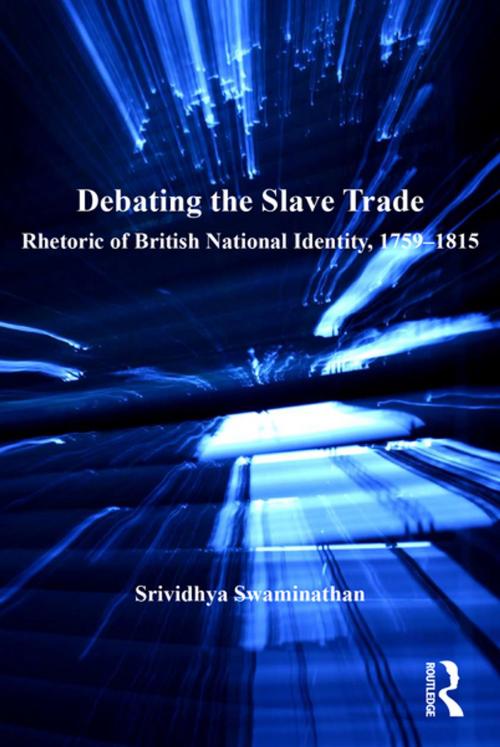Debating the Slave Trade
Rhetoric of British National Identity, 1759–1815
Fiction & Literature, Literary Theory & Criticism| Author: | Srividhya Swaminathan | ISBN: | 9781317154174 |
| Publisher: | Taylor and Francis | Publication: | May 13, 2016 |
| Imprint: | Routledge | Language: | English |
| Author: | Srividhya Swaminathan |
| ISBN: | 9781317154174 |
| Publisher: | Taylor and Francis |
| Publication: | May 13, 2016 |
| Imprint: | Routledge |
| Language: | English |
How did the arguments developed in the debate to abolish the slave trade help to construct a British national identity and character in the late eighteenth century? Srividhya Swaminathan examines books, pamphlets, and literary works to trace the changes in rhetorical strategies utilized by both sides of the abolitionist debate. Framing them as competing narratives engaged in defining the nature of the Briton, Swaminathan reads the arguments of pro- and anti-abolitionists as a series of dialogues among diverse groups at the center and peripheries of the empire. Arguing that neither side emerged triumphant, Swaminathan suggests that the Briton who emerged from these debates represented a synthesis of arguments, and that the debates to abolish the slave trade are marked by rhetorical transformations defining the image of the Briton as one that led naturally to nineteenth-century imperialism and a sense of global superiority. Because the slave-trade debates were waged openly in print rather than behind the closed doors of Parliament, they exerted a singular influence on the British public. At their height, between 1788 and 1793, publications numbered in the hundreds, spanned every genre, and circulated throughout the empire. Among the voices represented are writers from both sides of the Atlantic in dialogue with one another, such as key African authors like Ignatius Sancho, Phillis Wheatley, and Olaudah Equiano; West India planters and merchants; and Quaker activist Anthony Benezet. Throughout, Swaminathan offers fresh and nuanced readings that eschew the view that the abolition of the slave trade was inevitable or that the ultimate defeat of pro-slavery advocates was absolute.
How did the arguments developed in the debate to abolish the slave trade help to construct a British national identity and character in the late eighteenth century? Srividhya Swaminathan examines books, pamphlets, and literary works to trace the changes in rhetorical strategies utilized by both sides of the abolitionist debate. Framing them as competing narratives engaged in defining the nature of the Briton, Swaminathan reads the arguments of pro- and anti-abolitionists as a series of dialogues among diverse groups at the center and peripheries of the empire. Arguing that neither side emerged triumphant, Swaminathan suggests that the Briton who emerged from these debates represented a synthesis of arguments, and that the debates to abolish the slave trade are marked by rhetorical transformations defining the image of the Briton as one that led naturally to nineteenth-century imperialism and a sense of global superiority. Because the slave-trade debates were waged openly in print rather than behind the closed doors of Parliament, they exerted a singular influence on the British public. At their height, between 1788 and 1793, publications numbered in the hundreds, spanned every genre, and circulated throughout the empire. Among the voices represented are writers from both sides of the Atlantic in dialogue with one another, such as key African authors like Ignatius Sancho, Phillis Wheatley, and Olaudah Equiano; West India planters and merchants; and Quaker activist Anthony Benezet. Throughout, Swaminathan offers fresh and nuanced readings that eschew the view that the abolition of the slave trade was inevitable or that the ultimate defeat of pro-slavery advocates was absolute.















